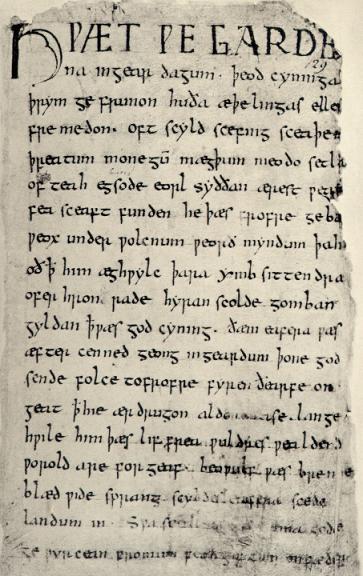
I finished Beowulf yesterday - part of my summer reading project so that I no longer have to be ashamed that I haven't read an essential text for the study of English - and have to say it was really good! What I appreciate most is the reminder that people have always been creative and poetic - texts such as this save us from what C.S. Lewis deemed "Chronological Snobbery." I think this is rooted in Darwinism and pride (obviously), to think that we're somehow better than people of the past. Yet we couldn't build pyramids without computers and cranes, and the Greeks knew the atom existed - though believed it un-dividable. The sharpest point you can have (other than diamond, I suppose) is Obsidian - and the Native Americans knew that. My point is, God gave us intelligence and we simply stand on the shoulders of the giants who have gone before. Similarly, God's truth has always been in the hearts of men - listen to what Hrothgar says to his hall after Beowulf has slain Grendel:
"It is a wonder to say how in His great spirit mighty God gives wisdom to mankind, land and earlship - He possesses power over all things. At times He lets the thought of a man of high lineage move in delight, gives him joy of earth in his homeland, a strong-hold of men to rule over...He lives in plenty; illness and age in no way grieve him, neither does dread care darken his heart...until his portion of pride increases and flourishes within him...what he has long held seems to him too little, angry-hearted he covets...in the end if happens in turn that the loaned body weakens, falls doomed; another takes the earl's ancient treasure."
This sounds so much like Ecclesiastes I was shocked to find it in a text that dates to the late 700s but deals with an early Christan environment c.449AD filled with pagan Germanic/Scandinavian ritual, dragons, and monsters. Written in Old English, it is considered the first 'English text' and shows that truly His wisdom never changes, and I'm so thankful that His gospel spread to the furthest reaches of the world and rooted itself so early in English history.
2 comments:
Amen, Leila. Thanks for pulling back and acknowledging the sovereignty of God even in this piece of literature.
This comment has nothing to do with your blog, even though it was a great blog! If you wander over to Chris Martin's blog, 'Prince Caspian' is soon to come out, and it made me think of you!
Post a Comment